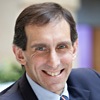 |
| Andrew Plump |
The new president at Takeda has raided Sanofi for its new head of global R&D. And they're putting their new top scientist in Cambridge, MA, which is becoming the world headquarters of drug research for much of the pharma industry.
Andrew "Andy" Plump has been lured to the top job at Takeda research after completing a stint as SVP of research and translational medicine at Sanofi ($SNY), where he worked in Paris. Plump, though, has deep roots in Cambridge, where he got his B.S. at MIT before getting his M.D. at UC San Francisco and a PhD at Rockefeller University. After his education he worked as a VP of cardiovascular at Merck ($MRK).
A Takeda spokesperson told Bloomberg that Plump will be based in Cambridge, MA, where the company has been reorganizing its oncology work. Takeda bought out Millennium, but recently dropped the iconic name.
The globalization of Takeda's leadership began in earnest with the recent appointment of Christophe Weber as the new president, now in line to become the first non-Japanese CEO in 230 years--a fact that has ruffled more than a few feathers in Japan, where "foreigners" have not been welcome by former execs and shareholders. Weber was brought in to revamp Takeda as the company's blockbuster Actos revenue has begun to disappear in the face of generic competition. U.S. president Doug Coles was recently ousted in the management shakeup that followed.
Sanofi, meanwhile, is losing an American exec in the wake of Christopher Viehbacher's stormy showdown with a French chairman of the board.
Global pharma organizations like Pfizer ($PFE), Novartis ($NVS) and others have been putting a growing emphasis on work around the Boston area, where biotech has been booming for years in neighborhoods close to MIT and Harvard. GlaxoSmithKline recently opened a new office to scout for deals in the area, following a similar move by J&J.
Takeda has had some success in the recent past, most notably the approval of vedolizumab for inflammatory bowel disease. But it's also had late-stage failures for TAK-875, or fasiglifam, as well as their top cancer contender at Millennium. Those setbacks helped trigger a plan to carve $1 billion out of its budget and lay off thousands.
- here's the release